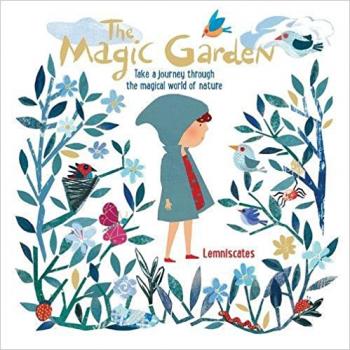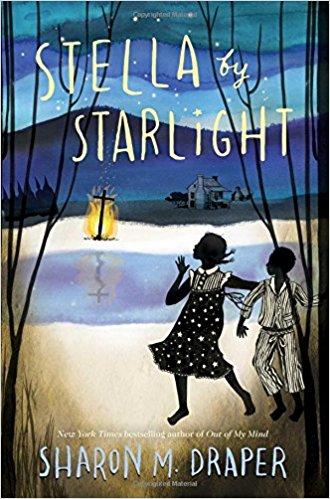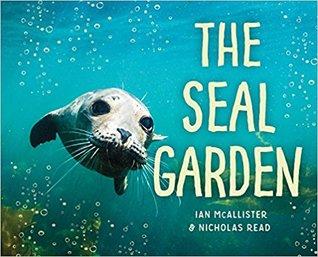
scrounge: /skrounj/ informal verb: to actively seek [books] from any available source

The Magic Garden is a simple book of lovely and whimsical illustrations that delves into the mysteries that exist right outside our doorsteps. It takes the reader on a little tour of an ordinary garden, pointing out some of the amazing creatures that live and work there, regardless of whether we notice them or not.
From snakes to spiders, bees to birds, we are encouraged to take a closer look at some of the more "shy" creatures that surround us every day. While I'm not really a fan of the word "magic" being used to describe nature, I do think the book is simply trying to communicate how intricate and mysterious some of the everyday facets of nature can be, even when they're ignored.
At the end of the book, there are some more detailed paragraphs about many of the creatures that are mentioned -- how they live, eat, weave, spin, etc.
(Thanks to NetGalley for the review copy.)
Scrounged From: NetGalley
Format: Kindle
Author/Illustrator: Lemniscates
Pages: 32
Content Advisory: None

I'm a bit surprised that I managed to obtain an English degree without being assigned to read Their Eyes Were Watching God, because I can see why it's such a major American novel.
In the afterword written by Henry Louis Gates, Jr., he mentions that Hurston saw her first novel (written a few years before this one) as "a manifesto against the 'arrogance' of whites assuming that 'black lives are only defensive reactions to white actions.'" This book also seems to avoid the reactionary point of view, and tries to simply capture black culture and people as they were, without requiring a "contrast" of white characters, unlike some of the other novels by black authors from the same period (a few of which I actually was assigned in college).
Hurston used vernacular speech in the dialog here, which for me meant it took a little longer to read, but sometimes that's a good thing. I loved the flow of the writing, and there were a few moments of humor as well. Toward the end of the story, the main characters are involved in a hurricane, which was a bit of deja vu to read during hurricane season last year when Florida had just been hit by Irma -- but this is one section where the descriptions are the best, and contains the title line.
To be honest, I didn't find Janie Crawford that sympathetic of a character in the beginning of the story, although the first page or so of the novel is a gem all on its own. But as the chapters passed and Janie and the scenery around her became more developed, I appreciated more the glimpse into this particular time and place, the way the story pulled me in, and the lyrical (as it has oft been described) style that is employed in so much of the narrative. The ending of the story navigated so well between heartbreak and determination, and kept me up past my bedtime (so in other words, I expected to like it a little but ended up liking it a lot).
Scrounged From: Our local flea market
Format: Paperback
Author: Zora Neale Hurston
Pages: 237
Content Advisory: A few swear words, a violent scene at the end (involving a gun) as well as a few instances and mentions of domestic violence, and a couple non-explicit sexual scenes.

Sakura's Cherry Blossoms is a sweet story about a girl who has to leave her home in Japan, including her grandmother. She and her grandmother used to sit together and eat under a cherry tree as it blossomed, and in America she does not see any cherry trees. Learning English and making friends are difficult things that she has to navigate in this new place.
The story touches on feelings of loss, not just of place, but of people we love (it doesn't specifically mention that Sakura's grandmother dies, but she does go back to visit her one last time to say goodbye, so it is assumed).
In the end, Sakura is sad but makes a friend, and learns to find things in her new home that help her remind her of her grandmother -- especially when spring comes and she realizes that some places in the US have cherry trees too!
The last page of the book explains that this story is written entirely in the "tanka" style of Japanese poetry, which is similar to haiku but includes two longer lines at the end as well. The phrasing and structure of some of the lines made more sense to me after this.
(In compliance with FTC guidelines, I disclose that I received this book for free through LibraryThing Early Reviewers. I was not required to write a positive review.)
Scrounged From: A LibraryThing giveaway
Format: Hardcover
Author: Robert Paul Weston
Illustrator: Misa Saburi
Pages: 40
Content Advisory: Sakura misses her grandmother and expresses sadness about leaving her (death is not explicitly mentioned, but illness is).

I enjoyed Stella by Starlight -- the story of a black girl named Stella who is living in the depression-era South. Stella doesn't have a lot of power over the events that take place around her -- the segregation, the hurdles her friends and family members are forced to go through just to attempt to cast a ballot, the KKK meetings across the lake, and the arson of the house of her friends. But she learns to find her voice and rely on her family and on the close-knit community she lives in.
Stella wants to write and be a writer, which does not seem entirely uncommon in books about adolescent children written by people who are also writers. What I appreciated was that her struggles and learning seem to be portrayed realistically for the most part. When Stella's teacher announces a writing contest, I expected that Stella, being the protagonist, was probably going to win. But she doesn't. And despite that, she keeps writing. I like seeing that in books aimed at middle grade readers especially -- it's not always about winning -- sometimes it's just about being willing to make mistakes and keep on trying, and the "winning," if it comes at all, may be many years down the road still. But Stella still fights and wins a few victories on the way.
To be honest, there were a few times when it seemed to me that Stella's "voice" sounded too much like an adult trying to speak through a child. Mainly in some of the metaphors and more abstract views she comes up with that seem like they'd be beyond her actual experience.
Still, a good read for the characterizations and writing style, as well as informative about this time period.
Scrounged From: Our local library
Format: Hardcover
Author: Sharon Draper
Pages: 320
Content Advisory: As mentioned in the review, KKK activities are mentioned, as well as a scene of arson, scenes of racial discrimination/demeaning treatment, and a few characters are injured or in peril at different times.

The photography in The Seal Garden is stunning. I love it when books use photographs of familiar creatures to introduce us to very specific places. This book covers "the seal garden," a special area of underwater vegetation in the Great Bear Sea off the coast of British Columbia, where seals and other animals can go to be safe from storms and predators.
There are some really lovely shots here, of seals swimming around under and above the water. My favorites were the pictures of shafts of light spreading through the water and plants. You get the feeling that this book was created by people who genuinely know and love the area, and is not just another "general nature information" project.
The text focuses on describing some of the animals that live in this environment and some of the things they may experience on a daily basis -- sheltering from a storm or a group of hunting orcas, eating fish, lounging on rocks, etc.
My only complaint is that I didn't see that the book ever actually tells us where the Great Bear Sea is, other than mentioning the Pacific Ocean. Since I'm not from the Pacific Northwest, the name was unfamiliar to me, so it's unfortunate that I had to resort to Google to figure out exactly where this place is located -- even a simple map would have been very helpful.
(Thanks to NetGalley for the review copy.)
Scrounged From: NetGalley
Format: Kindle
Author: Nicholas Read
Photographer: Ian McAllister
Pages: 32
Content Advisory: None


